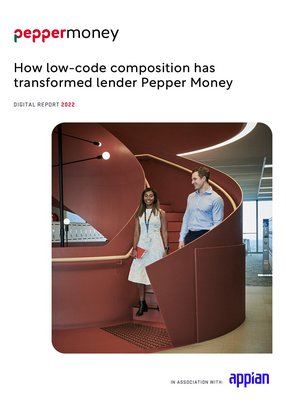How low-code composition has transformed lender Pepper Money
You can get a measure of a man from the way he describes his work. When Steven Meek, CIO of Pepper Money, talks to us from the firm’s state-of-the-art headquarters in Sydney, Australia, it’s well past the end of the working day. Many of his colleagues are heading home and a well-meaning cleaner is hoovering the sparse office. Still, Meek is brimming with enthusiasm about the role he has, describing his job as if it were an honour and not a vocation.
“It’s brilliant,” he says. “I feel privileged to be leading a very talented team, working on digital transformation, data and analytics, and core technology services and solutions. I’ve been fortunate throughout my career to have worked in multiple industries, from IT services and consumer goods to investment banking, helping all of the businesses I’ve worked for through periods of major change.”
That description is no less applicable to Pepper Money, which Meek joined in 2021. Founded in 2000, the lender began with mortgages, focusing on customers who couldn’t access finance through traditional means – whether that’s because they have an imperfect credit history, unpredictable income patterns or a life event that changed their financial circumstances. For more than two decades, Pepper Money has gradually ramped up its lending solutions with new propositions spanning homes, cars, electric vehicles (EVs), equipment, asset financing, commercial real estate, and personal loans.
“As a business, we have industry leading turnaround times, innovative technology that has been established over many years, and a team of more than 1,000 people that have helped 327,000 customers from all walks of life,” Meek says. “We're now one of the largest and most trusted non-bank lenders in Australia and New Zealand.”
Incumbent, off-the-shelf solutions weren’t working
Underpinning Pepper Money’s ascent is the fact that, to an extent, it has avoided some of the legacy issues that blight incumbent lenders – partly because, as a relatively young and agile organisation, it has managed to limit its exposure to legacy technology. Today, 90% of its digital architecture flows through cloud and SaaS platforms, ensuring it strikes a balance between resilience, agility and cost efficiency. Every lender is trying to make that application experience faster and more seamless, Meek explains, but success still depends heavily on manual processes for many.
“Our digitisation journey took off in 2018 when it was clear we were facing an increasingly digital and competitive market,” Meek says. “We recognised early that our incumbent off-the-shelf lending solutions needed a rethink. Strategically reviewing our digital architecture and unpacking all our front- and back-office processes has been a major focus. As part of this, we made the decision in 2019 to shift towards composable, low-code digital solutions to rapidly transform our origination channels and increase the level of innovation across the employee and customer experience.”
Among the new capabilities invested in, Pepper Money partnered with Appian, the US-based software company, to completely reimagine its digital architecture. The digital asset finance origination platform that it built, Solana, has led to a 70% increase in business volumes and brings Pepper’s proprietary credit decisioning capabilities to the foreground, using AI-driven analytics to achieve automated approval.
“Our incumbent solutions were hosted on premises, they were inflexible, and subsequently they weren't responsive enough for the changing needs of a rapidly growing and diversifying lending business,” Meek recalls.
“We needed something that could move at pace and that had all the benefits of cloud-only elastic scalability and security. We wanted something that could enable a marketplace of accelerator solutions, that enabled us to tap into innovation much faster than we could achieve internally. All these factors and the global scale Appian was able to bring contributed to the partnership we enjoy with them today.”
Pepper Money reaping benefits of low-code composition
For Pepper Money, the advantages of low-code platforms are fourfold. The first advantage is obvious: low-code builders allow companies to drastically reduce their speed-to-market, which, in Pepper Money’s case, is the time that a consumer is waiting for approval. Nobody applies for credit so they can experience delays and rejection, so making quick and informed credit decisions is vital.
Appian also gives the lender seamless integration with existing infrastructure, because by getting that right Pepper Money is able to coordinate complicated workflows involving many systems without exposing those systems directly to the end-customer or employee.
“Once again, the key is in the simplicity of use,” Meek adds. “The Appian building blocks and accelerator components mean that we can realise speed to market without having to build from scratch.
“The last advantage is what we call talent resilience, and to be honest we haven't unlocked the full potential of this yet. We recognise the longer-term benefit for low-code is to enable citizen development, where teams across the business with basic IT and coding knowledge can build applications, workflows and processes in minutes.”
Innovation sits at the heart of Pepper Money’s culture
In today’s world, where consumers and businesses alike must grapple with spiralling food and fuel prices, lenders have a more central role than ever. Innovation is paramount if lenders like Pepper Money are to keep pace with their customers’ needs.
Meek explains: “Like many economies around the world, the combined effect of rising inflation and rising interest rates means our customers, brokers and introducers are facing a period of uncertainty. It's a critical time right now for people to have peace of mind, fast turnaround on decisions and flexible loan options. From a digital and technology perspective, that means speed to decision, access to self-service options, transparency right across the digital journey and more automation for our people internally – they're all crucial right now to help our customers with those challenges.”
As an example, he points to the average approval rates for Pepper Money loans reported last financial year: an impressive 85% of all mortgage applications are approved in less than one day, and 42% of asset finance loans are auto-approved – made possible by Pepper fully embracing automation technologies. Rather than resting on its laurels, the lender is continuing to explore new uses for technology and realising new efficiencies as a result.
“Our continued investment in technology innovations – like intelligent document scanning, digital signatures, biometrics, automated valuations, digital income verification, and things like AI-driven analytics for our credit assessors – will continue enabling us to evolve our products and serve customers into the future.”
From a front-end perspective, that means benefits for Pepper Money’s customers as well. With its digital self-service platform, they can easily see their payout figure, download statements, and control payments in one place. There is also a set of personalised communications that keep them informed throughout their credit journey.
Working towards a clear vision of the future
As Pepper Money continues to scale and thrive, it will seek out new potential to add value. For example, when it comes to electric vehicle finance, Pepper Money has recently partnered with Evie Networks to offer customers that finance their EV with Pepper Money a public charging subscription package for 12 months at no cost.
“People come to Pepper for a purpose,” Meek says. “It's more about the broader value we can deliver for them and the service we offer, more than solely just a rate and the credit”.
“We're going to continue to invest in technology as the backbone of our business process management, origination, servicing, customer care and corporate capabilities. We want our customers, brokers and introducers to have a fast and frictionless experience, and we want our employees to have the same. They need to trust the data they're working with, and they need to feel enabled in successfully navigating our increasingly digitalised processes. The low-code and cloud-first platforms we use are fundamental in continuing to ensure we can scale efficiently as a business well into the future.”
“Over the next 12-18 months we’re focused on unlocking all the continued innovation opportunities available, ranging from tapping into Open Finance to enable new services and more seamless customer experiences, to rapidly expanding our use of automated identity verification, and continued real-time analytics integration that enables our people to have the insights required at their fingertips that drive pricing, product, and customer decisions faster than ever before.”
Clearly, the proof will be in the customer experience. Beyond transparent pricing and a range of products that resonate with them, the main thing applicants want from lenders during the application process is a rapid decision and a clear rationale for whatever that decision may be. Pepper Money has already served 327,000 customers; now it hopes that its roadmap for the future will enable it to empower even more customers to succeed.



